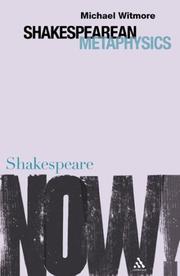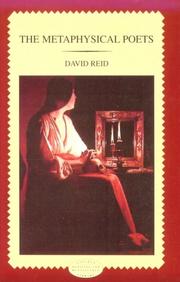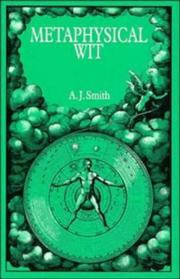| Listing 1 - 10 of 12 | << page >> |
Sort by
|

ISBN: 9780826490438 9780826490445 0826490433 0826490441 1282874772 1441149473 1472555503 9786612874772 9781441149473 9781282874770 9781472555502 6612874775 Year: 2008 Volume: *1 Publisher: London ; New York : Continuum,
Abstract | Keywords | Export | Availability | Bookmark
 Loading...
Loading...Choose an application
- Reference Manager
- EndNote
- RefWorks (Direct export to RefWorks)
Metaphysics is usually associated with that part of the philosophical tradition which asks about 'last things', questions such as: How many substances are there in the world? Which is more fundamental, quantity or quality? Are events prior to things, or do they happen to those things? While he wasn't a philosopher, Shakespeare was obviously interested in 'ultimates' of this sort. Instead of probing these issues with argument, however, he did so with plays. Shakespearean Metaphysics argues for Shakespeare's inclusion within a metaphysical tradition that opposes empiricism and Cartesian dualism.
Metaphysics in literature --- Metaphysics --- Shakespeare, William --- Shakespeare, William, --- Criticism and interpretation --- Philosophy --- Shakespeare, William, - 1564-1616 - Criticism and interpretation --- Shakespeare, William, - 1564-1616 - Philosophy --- Shakespeare, William, - 1564-1616 --- Metaphysics in literature. --- Criticism and interpretation. --- Philosophy.
Book
ISBN: 069106170X Year: 1969 Publisher: Princeton, N. J.
Abstract | Keywords | Export | Availability | Bookmark
 Loading...
Loading...Choose an application
- Reference Manager
- EndNote
- RefWorks (Direct export to RefWorks)
Poetry --- English literature --- anno 1600-1699 --- English poetry --- Metaphysics in literature. --- History and criticism. --- Poésie anglaise --- Métaphysique --- Histoire et critique. --- Dans la littérature.
Book
ISBN: 0333495675 9780333495674 0333495667 9780333495667 Year: 1992 Publisher: Basingstoke : Macmillan,
Abstract | Keywords | Export | Availability | Bookmark
 Loading...
Loading...Choose an application
- Reference Manager
- EndNote
- RefWorks (Direct export to RefWorks)
Book
ISBN: 1556193025 9789027277749 9027277745 9781556193026 9781556193033 1556193033 9789027217608 9027217602 9027217599 9027217602 1556193033 9789027217592 1283358638 9786613358639 Year: 1991 Publisher: Amsterdam Benjamins
Abstract | Keywords | Export | Availability | Bookmark
 Loading...
Loading...Choose an application
- Reference Manager
- EndNote
- RefWorks (Direct export to RefWorks)
This study of the fictional themes and techniques of Michel Tournier reveals his profound radicalism as a social critic and novelist despite the seeming conventionality of his works. Guided by Tournier's essays and interviews, Petit examines his fiction in light of plot sources, philosophical and anthropological training, and his belief that fiction should change the world. Close study of Vendredi ou les limbes du Pacifique, Le Roi des aulnes, Les Météores, Gaspard, Melchior et Balthazar, and La Goutte d'or, as well as the short fiction in Le Coq de bruyère and Le Médianoche amoureux, shows To
Book
ISBN: 1487590563 1487599986 9781487590567 9781487599980 9781487592066 Year: 1982 Publisher: Toronto
Abstract | Keywords | Export | Availability | Bookmark
 Loading...
Loading...Choose an application
- Reference Manager
- EndNote
- RefWorks (Direct export to RefWorks)
In this book, Professor Johnson demonstrates how Wordsworth employed geometrical patterns in the metrical construction of his verse and how the character of those patterns can be related to the poet's major philosophical values.
Metaphysics in literature. --- Geometry in literature. --- Wordsworth, William, --- Wœ̄tsawœ̄t, Winlīam, --- Wurdzwurth, Wilyam, --- Varḍsavartha Viliyama, --- Axiologus, --- Criticism and interpretation. --- Knowledge --- Mathematics.

ISBN: 0582298350 0582298342 Year: 2000 Publisher: Harlow Pearson
Abstract | Keywords | Export | Availability | Bookmark
 Loading...
Loading...Choose an application
- Reference Manager
- EndNote
- RefWorks (Direct export to RefWorks)
Poetry --- English literature --- Philosophy --- anno 1600-1699 --- anno 1500-1599 --- 820-1 "15/16" --- Engelse literatuur: poëzie--?"15/16" --- English poetry --- Metaphysics in literature. --- History and criticism. --- 820-1 "15/16" Engelse literatuur: poëzie--?"15/16" --- Metaphysics in literature --- History and criticism
Book
ISBN: 081739091X 9780817390914 9780816536337 0816536333 9780817358860 0817358862 9780816535514 Year: 2016 Publisher: Tuscaloosa
Abstract | Keywords | Export | Availability | Bookmark
 Loading...
Loading...Choose an application
- Reference Manager
- EndNote
- RefWorks (Direct export to RefWorks)
Sound in literature. --- Metaphysics in literature. --- Poetics --- Sound poetry --- Music and literature --- Phonetic poetry --- Poesie sonore --- Sonorist rhythms (Poetry) --- Sound poems --- Poetry --- Sounds in literature --- History --- History and criticism. --- Stevens, Wallace, --- Technique.
Book
ISBN: 0826356710 9780826356710 9780826356703 0826356702 Year: 2016 Publisher: Albuquerque
Abstract | Keywords | Export | Availability | Bookmark
 Loading...
Loading...Choose an application
- Reference Manager
- EndNote
- RefWorks (Direct export to RefWorks)
A Bloody and Barbarous God investigates the relationship between gnosticism and the perennial philosophy and how these traditions have influenced the later novels of Cormac McCarthy, namely, Blood Meridian, All the Pretty Horses, The Crossing, Cities of the Plain, No Country for Old Men, and The Road.
Spirituality in literature. --- Mysticism in literature. --- Philosophy in literature. --- Gnosticism in literature. --- Apocalypse in literature. --- Good and evil in literature. --- Metaphysics in literature. --- Evil in literature --- Good in literature --- McCarthy, Cormac, --- מקארתי, קורמאק, --- McCarthy, Charles, --- Criticism and interpretation.

ISBN: 0521340276 0521035295 0511553390 9780521340274 9780511553394 9780521035293 Year: 1991 Publisher: Cambridge Cambridge University Press
Abstract | Keywords | Export | Availability | Bookmark
 Loading...
Loading...Choose an application
- Reference Manager
- EndNote
- RefWorks (Direct export to RefWorks)
English metaphysical poetry, from Donne to Marvell, is notoriously witty. In this 1992 book, A. J. Smith seeks the reason for the central importance of wit in the thinking of the metaphysical poets and argues that metaphysical wit is essentially different from other modes of wit current in Renaissance Europe. Formal theories and rhetorics of wit are considered both for their theoretical import and their appraisals of wit in practice. Prevailing fashions of witty invention are scrutinized in Italian, French and Spanish writings, so as to bring out the nature and effect of various forms of wit: conceited, hieroglyphic, transformational and others from which the metaphysical mode is distinguished. He locates the basis of Renaissance wit in the received conception of the created order and a theory of literary innovation inherent in Humanist belief, which led to novel couplings of time and eternity, body and soul, man and God.
Poetry --- Comparative literature --- Thematology --- anno 1500-1799 --- Metaphysics in literature --- Literature, Comparative --- English poetry --- English wit and humor --- European and English --- History and criticism --- English and European --- Arts and Humanities --- Literature --- Literature, Comparative - European and English --- English poetry - Early modern, 1500-1700 - History and criticism --- English wit and humor - History and criticism --- Literature, Comparative - English and European --- Metaphysics in literature. --- History and criticism. --- English and European. --- European and English. --- Philology

ISBN: 0812216768 9786613212375 1283212374 0812205456 0812234693 9780812216769 9780812234695 Year: 1999 Publisher: Philadelphia, Pa University of Pennsylvania Press
Abstract | Keywords | Export | Availability | Bookmark
 Loading...
Loading...Choose an application
- Reference Manager
- EndNote
- RefWorks (Direct export to RefWorks)
Although readers of detective fiction ordinarily expect to learn the mystery's solution at the end, there is another kind of detective story—the history of which encompasses writers as diverse as Poe, Borges, Robbe-Grillet, Auster, and Stephen King—that ends with a question rather than an answer. The detective not only fails to solve the crime, but also confronts insoluble mysteries of interpretation and identity. As the contributors to Detecting Texts contend, such stories belong to a distinct genre, the "metaphysical detective story," in which the detective hero's inability to interpret the mystery inevitably casts doubt on the reader's similar attempt to make sense of the text and the world.Detecting Texts includes an introduction by the editors that defines the metaphysical detective story and traces its history from Poe's classic tales to today's postmodernist experiments. In addition to the editors, contributors include Stephen Bernstein, Joel Black, John T. Irwin, Jeffrey T. Nealon, and others.
Detective and mystery stories --- Experimental fiction --- Fiction --- Metaphysics in literature. --- History and criticism. --- Technique. --- Metafysica in de literatuur --- Metaphysics in literature --- Métaphysique dans la littérature --- anno 1900-1999 --- History and criticism --- American fiction --- 20th century --- Technique --- Fiction writing --- Metafiction --- Writing, Fiction --- Authorship --- Detective and mystery stories - History and criticism --- Experimental fiction - History and criticism --- Fiction - 20th century̨ - History and criticism --- Fiction - Technique --- ROMAN POLICIER --- LITTERATURE EXPERIMENTALE --- METAPHYSIQUE DANS LA LITTERATURE --- HISTOIRE ET CRITIQUE
| Listing 1 - 10 of 12 | << page >> |
Sort by
|

 Search
Search Feedback
Feedback About UniCat
About UniCat  Help
Help News
News